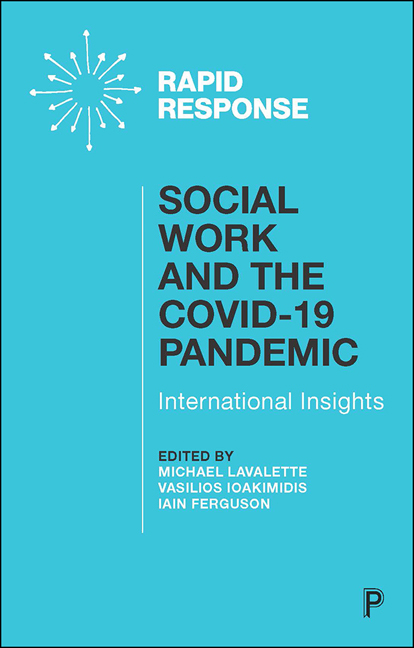6 - Social Work and the COVID-19 Crisis in the United States
Published online by Cambridge University Press: 23 March 2021
Summary
The situation in the United States and the government's Response
As of 5 August 2020, there have been 4,966,524 million people in the United States diagnosed with the coronavirus and over 161,000 deaths, more cases than any other country in the world (Worldometers 2020). The federal government's response to this crisis, under the for-profit healthcare system, has been nothing less than appalling and horrific. The Trump administration, with its allies in Congress and the states, are united by an ideology that distrusts any role for government except the redistribution of wealth upward to the wealthy and the surveillance and repression of dissidents, immigrants and people of colour. It's abdication of responsibility for a unified national response to the pandemic guided by science and sound public policy has been total.
Given the absence of an overall federal response, each state or county or city has been left to develop and implement its own rules and policies, except to the extent that some states, under Republican control, such as Arizona, have attempted to block efforts of Democratic mayors to impose effective healthcare restrictions. As a result of this piecemeal approach, the effectiveness of state and local responses has varied wildly. For example, in New York, face masks are required for anyone over the age of two when out in public, travellers arriving from states with high rates of transmission must self-quarantine for 14 days and indoor dining is still prohibited. In Chicago, the public schools will feature remote learning only. In Georgia, indoor dining is permitted, public schools are open and face masks are not required (Bunis and Rough 2020).
In Boston, the city built heated tents for people experiencing homelessness to shelter during the worst period of the crisis while in Las Vegas, Nevada the city turned a parking lot into a so-called shelter by painting white boxes on the ground six feet apart while there were an estimated 100,00 hotel rooms unused. Bidding wars between states to obtain crucial supplies, medicine and protective equipment were not uncommon.
- Type
- Chapter
- Information
- Social Work and the COVID-19 PandemicInternational Insights, pp. 45 - 52Publisher: Bristol University PressPrint publication year: 2020



